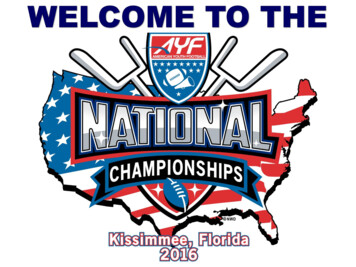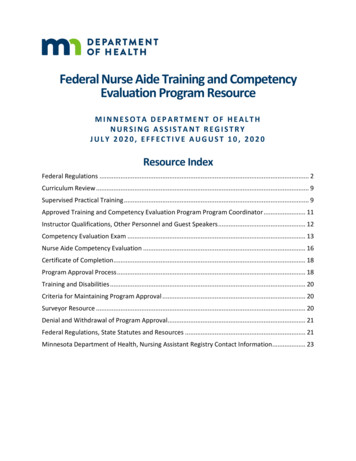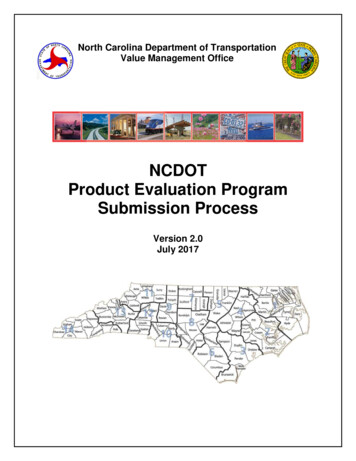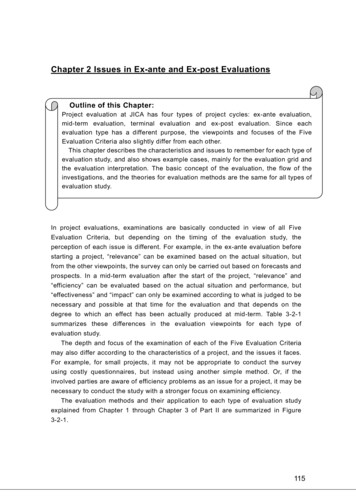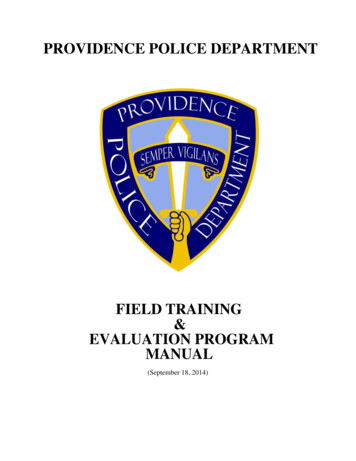
Transcription
PROVIDENCE POLICE DEPARTMENTFIELD TRAINING&EVALUATION PROGRAMMANUAL(September 18, 2014)
Field Training & Evaluation Program ManualTable of ContentsSECTION I.Field Training and Evaluation Program (FTEP) PolicySECTION II.Probationary Patrol Officers’ GuideSECTION III.Mandatory ConductSECTION IV.Standardized Evaluation GuidelinesSECTION V.FormsSECTION VI.1)First Day Inspection2)Daily Observation Report3)Sergeant’s Weekly Observation Report4)Evaluation of Field Training Officer5)Probationary Patrol Officer Self-Evaluation6)Remedial Training Worksheet7)Field Training Recommendation ReportField Training ChecklistPage 1 of 56
Field TrainingAndEvaluation Program(FTEP) PolicyPage 2 of 56
Field Training and Evaluation Program (FTEP)PolicyPurposeThe purpose of this policy is to outline the formation and operation of a Field Training andEvaluation Program (FTEP).PolicyIt is the policy of the Providence Police Department to have an effective Field Training andEvaluation Program (FTEP).DiscussionThe FTEP has been developed with the ultimate goal of improving the overall effectiveness of theDepartment.This FTEP is of an eight (8) week duration, and will have provisions for additional time andtraining should the need arise. Although the new probationary patrol officer will have met allacademic requirements and obtained basic technical skills upon graduating from the ProvidencePolice Academy, it is necessary to determine whether or not he/she has the ability to successfullyapply those skills into becoming a successful member of the Department.For the purpose of this policy, the following definitions shall apply:Field Training and Evaluation Program (FTEP) - A structured and closely supervisedprogram provided to probationary patrol officers to facilitate the application of skills andknowledge obtained in the academy/classroom to actual performance in on-the-job situations.This program is designed to identify compliance and/or deficiencies in work performance,document procedures and provide a mechanism by which performance can be evaluated.Daily Observation Report (DOR) - A daily report prepared by a Field Training Officersupervising a probationary patrol officer. This report evaluates his/her progress, identifiesproblems, and remedial efforts observed on a daily basis by a Field Training Officer.Sergeant’s Weekly Observation Report - A weekly report prepared by a Field Training Sergeantthat assists in providing the program with a system of checks and balances to ensure that the FieldTrading Officer is fulfilling his/her responsibilities. It will also provide an opportunity for the FieldTraining Officer Supervisor to quickly identify the proficiency of each probationary patrol officer.Page 3 of 56
Field Training Commander - The commanding officer of the Providence Police DepartmentUniformed Division, or his designee, responsible for overseeing the overall operation of the FieldTraining and Evaluation Program and the Field Training Director.Field Training Director - A member of the Providence Police Department who has attained atleast the rank of Sergeant, and who is assigned or detailed to the Uniformed Division andappointed by the Field Training Commander for his/her expertise in the Field Training andEvaluation Program, in order to direct and oversee the day-to-day operations of the FTEPprogram.Field Training Sergeant - A member of the Providence Police Department who has attained therank of Sergeant and who has been trained to deliver the FTEP to probationary patrol officers.The Field Training Sergeant serves as a liaison to the Field Training Director and assists in thedaily monitoring of Field Training Officers and probationary patrol officers.Field Training Officer (FTO) - A member of the Providence Police Department who isassigned to the Patrol Bureau and who has been carefully selected and trained to deliver theFTEP to a probationary patrol officer.Probationary Patrol Officer – A sworn member’s initial job title and status with the Departmentupon successful graduation from the Providence Police Training Academy and until successfulcompletion of the obligatory eighteen (18) months probationary period. Probationary patrolofficers are required to successfully complete the FTEP as a condition of continued employment.During the probationary period, the probationary patrol officer possesses all the powers of theposition to which he/she is appointed and is covered by all of the provisions of the CollectiveBargaining Agreement, with the exception that in the event of termination of employment, aLaw Enforcement Officers’ Bill of Rights Hearing will not apply.ProceduresI.FTEP Requirement for Probationary Patrol Officers - The Field Training andEvaluation Program will be a mandatory and critical phase in the training andperformance assessment of all probationary police officers. This program will takeplace immediately upon satisfactory completion of the Providence Police Academy.All probationary patrol officers will participate in the Field Training and EvaluationProgram (FTEP).Every effort should be made to assign probationary patrol officers to work during bothdaylight and nighttime hours. This will allow new members the opportunity to perform allfacets of their operational duties and to learn the nuances involved in different shifts.II.Selection of Field Training Officers – The Field Training Officer (FTO) performs animportant role in the FTEP. The FTO should be a model of what the Department expectsPage 4 of 56
from the probationary patrol officer, and is ultimately responsible for the transformationof the probationary patrol officer into a solo patrol officer. The FTO should have goodcommunication and report writing skills, as well a solid grasp of the Department’spolicies, procedures and overall mission. Candidates for the position must meet thefollowing criteria:A.B.Must have completed three (3) years of service with the Providence PoliceDepartment; must be presently assigned to the Uniformed Division; and must meetthe following requirements:1.If an officer is not assigned to the Uniformed Division, he/she must betemporarily transferred to the Uniformed Division.2.A work history indicating above average initiative and self-motivation.3.No sustained civilian or administrative complaints for twelve months prior toapplication and appointment to the FTEP.4.A positive review of the prospective FTO’s personnel, Office of ProfessionalStandards, IOD, and sick time records.5.Ability to communicate as an instructor and immediate supervisor.6.Ability to make a two (2) year commitment to the FTEP.7.Willingness to work overtime, when necessary, to accomplish training.8.Successful completion of a mandatory course of instruction for FieldTraining Officers that meets Rhode Island POST certification standards.Must not be the subject of any formal disciplinary actions within the previous twelvemonths, excluding suspension from the Detail List.1.Must not be currently serving a probationary period resulting from anyprevious formal discipline.a.If an FTO candidate is subject to any of the above, he/she maypetition the Chief of Police to have the eligibility restriction waived.b.The Chief of Police, after consultation with the Field trainingCommander and the Field Training Director, shall render a decisionconcerning said petition.c.In the event that an established FTO receives a disciplinary suspension,he/she shall be removed from the program for a minimum of one year.After one year, the Officer may petition the Chief of Police forreinstatement to the FTO program in the process outlined in subsections(b) and (c) above.Page 5 of 56
d.III.C.The Field Training Commander and Field Training Director will review theapplications and files of FTO candidates and ensure that all eligibility criteria aremet. The list of acceptable applicants will be forwarded to the Chief of Police forfinal approval.D.Compensation for FTOs who are actively participating in training probationarypatrol officers will be one (1) hour of overtime per training shift. In addition, oneof three levels of compensatory days will be awarded to each participating FTOat the conclusion of the training period. Primary FTOs will receive 3 days,Secondary FTOs will receive 2 days, and FTOs that serve in both a Primary andSecondary capacity will receive 4 days.Completion of the FTEP - Upon the completion of the FTEP, FTOs and Field TrainingSupervisors will make a recommendation for each probationary patrol officer to continuealong one of the following paths: A.Assignment for solo patrol.Continued field training.Termination of employment.In a case of a recommended termination, a pre-termination hearing will be held atProvidence Police Headquarters, 325 Washington St., Providence, Rhode Island.1.IV.FTOs serve at the discretion of and with the approval the Chief of Police;said approval may be revoked by the Chief of Police at any time.The hearing will consist of a review with the probationary patrol officer, theinvolved Field Training personnel, the Commanding Officer of the UniformedDivision, and the Chief of Police, in order to provide an opportunity for theprobationary patrol officer to:a.Review the formal charges against him/her.b.Review the evidence against him/her.c.R espond in his/her own defense.FTEP Chain of CommandA.The FTEP is a training and evaluation program within the Patrol Bureau of theUniformed Division, and as such, it is imperative that the program’s goals andobjectives be implemented and supervised by individuals who have been instructedin said goals and objectives and who understand the importance of adherence tothem.Page 6 of 56
B.C.V.1.Chief of Police and/or his designee (i.e. – Deputy Chief of Police).2.Commanding Officer of the Uniformed Division.3.Field Training Commander, if designated.4.Field Training Director.5.Field Training Sergeants.6.Field Training Officer (FTO).7.Probationary Patrol Officer.The Field Training Commander is responsible for the overall management andadministration of the FTEP and for ensuring the dutiful fulfillment of personnelresponsibilities.Responsibilities of the Field Training CommanderA.VI.The Providence Police Department’s FTEP Chain of Command is as follows, indescending order:The Field Training Commander oversees the overall management and administrationof the FTEP and is responsible for the following:1.Keeping the Chief of Police and/or his designee informed regarding allactivities and individuals within the Department’s FTEP program.2.Identifying those probationary patrol officers who are prepared to function in asolo capacity.3.Approving or denying any FTEP extensions4.Submitting recommendations to the Chief of Police regarding termination ofa probationary patrol officer from the FTEP program and the Department.Responsibilities of the Field Training DirectorA.T he Field Training Director oversees the daily operations of the FieldTraining and Evaluation Program and is responsible for the following:1.Supervising and scheduling FTOs as well as coordinating with the TrainingBureau staff in assigning individual probationary patrol officers to their FTOs.Page 7 of 56
VII.2.Reviewing all Daily Observation Reports (DORs), Sergeant’s WeeklyObservation Reports, and other evaluation documents submitted by FTOs.3.Forwarding the Sergeant’s Weekly Observation Reports to the Field TrainingCommander.4.Evaluating and updating the FTEP manual, and making recommendations to theFTEP Commander regarding the Department’s FTEP, as necessary.5.Making recommendations regarding, and participating in the selection of,FTOs.6.Ensuring that the basic tenets and criteria of the FTEP are being met on a dailybasis.7.Participating in the final evaluations of a probationary patrol officers, andpreparing written documentation for presentation to the Field TrainingCommander regarding the advancement, retention, re-training, extension, ortermination of a probationary patrol officer.Responsibilities of the Field Training SergeantsA.Field Training Sergeants are responsible for the following:1.Acting as the FTO’s immediate supervisor.2.Submitting weekly evaluation reports.3.Reviewing an FTO’s final evaluation report.4.Ensuring that the criteria within the FTEP manual are being met.VIII. Responsibilities of FTOsA.FTOs are responsible for the following:1.Performing the normal duties and responsibilities of a patrol officer.2.Providing training to any assigned probationary patrol officers.3.Ensuring that the Field Training Checklist is initialed and dated as respectivetasks are addressed during the course of the FTEP.4.Functioning as the probationary patrol officer’s immediate supervisor.Page 8 of 56
IX.5.Evaluating the probationary patrol officer’s performance and completing therequired DORs.6.Submitting the evaluation forms and Field Training Checklist to the FieldTraining Sergeant.Field Training Officer Insignia PatchA.The Field Training Officer insignia patch (below) will be issued to those officers whohave been selected and trained as FTOs. The patch will be worn on the uniform ofthe day, sown onto the sleeves in the same location where sergeant’s stripes would beaffixed:NOTE: This directive and the FTEP manual are for internal use only, and do not enlargean officer's civil or criminal liability in any way. Neither should be construed as thecreation of a higher standard of safety or care in an evidentiary sense, with respect to thirdparty claims. Violations of either this directive or the FTEP manual, if proven, can onlyform the basis of a complaint by this Department, and then only in a non-judicialadministrative setting.APPROVED:APPROVED:STEVEN M. PARÉCOMMISSIONERDEPARTMENT OF PUBLIC SAFETYHUGH T. CLEMENTS, JR.COLONELCHIEF OF POLICEPage 9 of 56
ProbationaryPatrol Officers’GuidePage 10 of 56
Probationary Patrol Officers’ GuideUpon completion of the Providence Police Academy, you will be sworn-in as a probationary patrolofficer. You will then be assigned to the Department’s Field Training and Evaluation Program(FTEP), which is administered by the Field Training Unit, Patrol Bureau, Uniformed Division. Uponassignment, you will undergo eight (8) weeks of intensive field training under the supervision of aField Training Officer (FTO).The FTEP is a nationally-accepted training program designed to help the probationary patrol officermake the transition from the classroom environment of the police academy to the practicalapplication of skills in field situations. Your FTOs have been chosen for their superior knowledgeand abilities to perform all aspects of policing in a professional and efficient manner, as well as fortheir abilities to impart this necessary knowledge to you.Training for police officers has evolved over the years. An example of early training methods mightbest be described as the “sink or swim” approach. Preparation for the job consisted of little more thanthe issuance of a firearm and the keys to a patrol vehicle. If a new officer made it past their first year,they were either truly innovative or very lucky. Eventually, new officers were assigned as partners tosenior officers and received a form of on-the-job training. This type of training was nothing more thana “popularity contest”. If the senior officer liked you, you would most likely succeed; if not, yourfuture success as a police officer was in doubt.A drastic change in law enforcement training occurred with the introduction of the police academy.This method of training, which is still with us today, has undergone many format changes andimprovements. However, while the police academy is an efficient method of introducing the newofficer to the duties and responsibilities of police work, it does not adequately prepare the new officerfor assignment to a one (1) officer patrol car. Consequently, police departments developed fieldtraining and evaluation programs to help the new officer make the transition from the academy to thefield.The present FTEP, which is utilized by most police departments throughout the nation, is a version ofthe “San Jose model”, a concept that was originally developed and implemented in San Jose,California. The original concept has been modified to match the needs of the Department withoutcompromising its integrity. It should enable you, the probationary patrol officer, to reach anacceptable level of performance within the stipulated eight (8) week training period. Your successdepends on your attitude and willingness to dutifully perform all necessary job functions.The FTEP is time consuming and demanding for both you and your FTO, but the payoff will be wellworth it for you, the Providence Police Department, and the City of Providence.Page 11 of 56
StructureThe FTEP is structured so that you will know who is responsible for your direct supervision and whereto turn for help at all times. It also ensures proper monitoring and assessment of your training.The chain of command, as in any organization, is basic to the structure of the program.As in all such command structures, you should not violate the basic tenet of how communication flowsbi-directionally through the chain. In the FTEP chain of command, your direct supervisor is the FTO.You should communicate directly with him/her and not go to anyone else for assistance unless thesituation is of an urgent nature and your FTO is not available. While you will occasionally havecontact with Field Training Sergeants and the Field Training Director, you shall communicate primarilywith and through your FTO. This procedure is necessary to ensure proper training and the absence ofconflicting information.Phase RotationAs a probationary patrol officer, you will be rotated through various patrol shifts. This is done togive you exposure to the different patrol shifts and the respective working conditions therein.Furthermore, a four (4) day on-duty, two (2) day off-duty work schedule will be followed, inaccordance with the Department’s Patrol Bureau contractual schedule.Phase I – This is known as the grace period. You will be expected to observe what your primaryFTO does and to ask questions that come to mind as you adjust to your new assignment. Even thoughyour FTO will operate the patrol vehicle and initiate most actions, it is expected that you will functionas more than a mere a passive observer. You will be expected to learn various duties andresponsibilities from observing your FTO and by participating as required/instructed. The duration ofPhase I is one (1) week.Phase II – You will remain with your primary FTO during this period. Gradually, you will be givenmore responsibility and more tasks to perform. You will be trained and evaluated by your FTO on thetasks you perform in the field and how well you perform them. The duration of Phase II is two (2)weeks.Phase III – You will be assigned to a secondary FTO at this time and work a different shift than theone to which you were previously assigned. During this period you will be trained and evaluated byyour FTO on the tasks that you perform in the field. You will remain with your Secondary FTO forthree (3) weeks.Phase IV – You will be rotated back to your primary FTO for continued training and evaluation.The duration of Phase IV is one (1) week.Phase V – Evaluation phase only. Your primary FTO will accompany you but will not be expectedto train you during this period, although feedback will be given. You will conduct yourself as would asenior patrol officer, operating the police vehicle and taking the lead role in all patrol activities. YourFTO will have the option of wearing civilian clothing during this week and will not take any actionexcept in those instances where “stepping in” is necessary to avoid liability and/or to maintain officerand citizen safety. This phase will last one (1) week.Page 12 of 56
Upon the successful completion of the five phases of the FTEP and the recommendations of your FieldTraining Officer and the Field Training Director, you will then be assigned to the Uniformed DivisionPatrol Bureau as a solo patrol officer.Interruption of Training for Exigent Circumstances OnlyDuring the FTO training period, you, as a probationary patrol officer, will be expected to attend alltraining sessions. However, exigent circumstances may arise which will require an extended periodof absence from the program. Such circumstances may include, but are not necessarily limited to:the death of an immediate family member; an incapacitating injury; or any of various otheremergency situations.At the written recommendation of the FTO, and with the concurrence of those ranked above the FTOwithin the FTEP chain of command, the Field Training Director, at his/her discretion, may grant suchemergency “leave of absence” from the FTEP program. The amount of leave granted should beconsistent with the circumstances. The Field Training Director may require verification of existingemergency before granting or continuing any leave.Upon your return, you, as a probationary patrol officer, will resume your training from thepoint of interruption.The Field Training Director has the authority to extend your training beyond the stipulated eight (8)week time frame. This extension may be applied when problems are identified that would hinder yourperformance as a solo patrol officer; or, if you are behind schedule to such a point that the expectedschedule would not allow for successful completion of the required work. An FTEP extension allowsthe Field Training Unit to work with you on specific problem areas in a manner that is consistent withoptimal learning, performance and evaluation. If an extension is deemed necessary and granted, youshould considered it as an opportunity to practice and hone the skills required to successfully advancethrough the FTEP. An FTEP is a part of a positive process that is remedial in nature and intended toassist you in getting back on track with your training. No stigma will be attached to your reputationshould you receive an FTEP extension.Details, Overtime/Callback and CourtAs a probationary patrol officers, you will not be allowed to take private duty details during yourtraining period.Probationary patrol officers are not eligible for “callback” to duty during their training period, but theyare eligible for “overtime”, insofar as the overtime is related to a late arrest and the ensuing compilationof required paperwork.If you are required to appear at Municipal Court, the RI Traffic Tribunal, District Court, and/orSuperior Court, due to work related matters, you will be required to submit the appropriate “court slip”and will be compensated at the rate of pay stipulated by contract.Page 13 of 56
Evaluation Guidelines and FTO Evaluation SessionsYou have been given a set of standardized evaluation guidelines. These guidelines are very important,as they encompass the standards by which you will be evaluated. You will not be compared to tenuredofficers; nor will you be compared to your peers. These guidelines have been developed to ensure thatall field training officers employ the same standards when evaluating all probationary patrol officers.The Daily Observation Report (DOR) conforms to the standardized evaluation guidelines. The DORcovers the categories of appearance, attitude, knowledge, performance, and relationships.See the section of this manual entitled “Standardized Evaluation Guidelines” for further information.Evaluation sessions are an opportunity for your FTO to meet with other FTEP supervisory personnel inorder to discuss a variety of FTEP issues. In addition, your progress to date, your performancestrengths and weaknesses, and any remedial training strategies are discussed among your primary andsecondary FTOs and the Field Training Director.The objectivity of the ratings is reviewed with an eye toward maintaining standardization. Eachprobationary patrol officer’s Field Training Checklist (see next section) is discussed to ensure thattheir training, and the training of the department, is up to date. These meetings are designed to assistthe Field Training Unit in helping you to satisfactorily complete the program.Field Training ChecklistThere are numerous identifiable tasks that you must be able to accomplish in order to performcompetently as a police officer. It is the FTO’s responsibility to help you develop the skills that arerequired to master these tasks. To assist the FTO in completing this responsibility, a Field TrainingChecklist has been developed.The Field Training Checklist will be kept in your possession during your training period. It will serveas the FTO’s guide to what you will need to learn. It will also serve as a reference, identifying whichtasks you have learned and which tasks remain to be learned. Your FTO is responsible for signing-offon each of these tasks as you learn them by affixing his/her initials, badge number, and the date of taskcompletion on your checklist. Only in this way will it be recorded that you have been instructed on aparticular task’ performed the task; and/or demonstrated knowledge pertaining to the task. You willalso initial and date each entry made by your FTO.Successful completion of the FTEP will not be accomplished until each task category is marked byboth the Field Training Officer and the probationary patrol officer as having been covered during aperiod of instruction, or that the Probationary patrol officer has performed or demonstrated the taskcategory.Report LogYou will maintain a log of all the reports you and/or your FTO have compiled during your training.You will note the report number, type of report, the date, and whether you or your FTO compiled thereport. Your FTO will initial the entry.Page 14 of 56
SummaryAn important point to remember is this: You must give us the chance to train you!If you resist training and/or evaluation, or if you underestimate the importance of the FTO’s time andexperience, you will not fully contribute to your successful completion of the FTEP.It is our desire and responsibility to help you become a fully competent police officer. The best advicewe can give to you is to be confident and to take an active role in your training. When you are in thefield, give your FTO something to evaluate. New officers learn from their mistakes, and we expectthat you will make many of them. We will be evaluating your ability to learn from your mistakes. Wewill also be evaluating the FTEP and how we can better adjust our training process and assist our newofficers to be successful. This is one of the central concepts of a field training and evaluation program.You will find that this program can be stressful, but you will also find that it is the most enjoyable andrewarding part of your training. We are very enthusiastic about the FTEP and we expect you to beenthusiastic about completing the program.Page 15 of 56
MandatoryConductPage 16 of 56
Mandatory ConductTrainingFTOs will abide by the FTEP philosophy, which states that FTOs will make every effort to train anddirect each probationary patrol officer in ways that will maximize the possibility of success. FTOsmust strive to maintain a positive training atmosphere and ensure that each probationary patrolofficer receives sufficient opportunities to show that he/she can perform all essential job functions tothe best of his/her ability. It is impossible to entirely eliminate the stress caused by the constantevaluation of performing new tasks, but such stress should be minimized as much as possible by theFTO. Any stress experienced by the probationary patrol officer should be the result of theperformance of the task itself and not from the learning environment fostered by the FTO.FTOs shall conduct themselves in a professional manner at all times. They must educate probationarypatrol officers and ensure their compliance with Department directives. They must project themselvesas examples to be emulated by virtue of their superior knowledge, demeanor, and appearance. FTOsshould remember that the probationary patrol officer will ultimately be a product of what and howhe/she is taught, and of the behavior that is demonstrated to him/her.Solo Patrol Officer ConceptFTOs will utilize the “solo patrol officer” concept to evaluate probationary patrol officers, and shouldkeep in mind the need for a balance between training and evaluation to exist. Evaluation will be givenin an honest, straightforward, professional manner, stressing positive performance and constructivelycorrecting sub-par performance.For the purpose of satisfying “minimum manning” standards, the FTO and probationary patrol officerwill be considered a single patrol unit. This applies to officer safety, prisoner transport, and prisonerwatch scenarios as well.Solo Patrol While in the FTEPWhile in the FTEP, no probationary patrol officer will be allowed to go on solo patrol for any reason.Daily Observation Reports (DORs)When completing the DOR, Field Training Officers will refer to the Standardized EvaluationGuidelines outlined in this document to ensure uniformity and standardization of evaluations withinthe program.Page 17 of 56
Use of Non-Field Training Officers for Field TrainingNon-FTOs will not be utilized to train probationary patrol officers in the field in a “ride-along”situation, except when specifically authorized by the Field Training Sergeant for a specific purpose,or in situations where there is no alternative. A Field Training Sergeant should attempt to obtainpermission from the Field Training Director prior to placing the probationary patrol officer with anon-FTO. If time does not allow for prior permission to be obtained, the Patrol Bureau shift OIC(and/or District OIC) to which the officer will be assigned shall be advised of the use of the non-FTOand the specific reason for such use.Final Evaluation Only PhaseDuring this phase of training, which occurs during the last week of the FTEP prior to solo duty, theFTO ma
Training and Evaluation Program and the Field Training Director. Field Training Director - A member of the Providence Police Department who has attained at least the rank of Sergeant, and who is assigned or detailed to the Uniformed Division and appointed by the Field Training Commander for his/her expertise in the Field Training and
